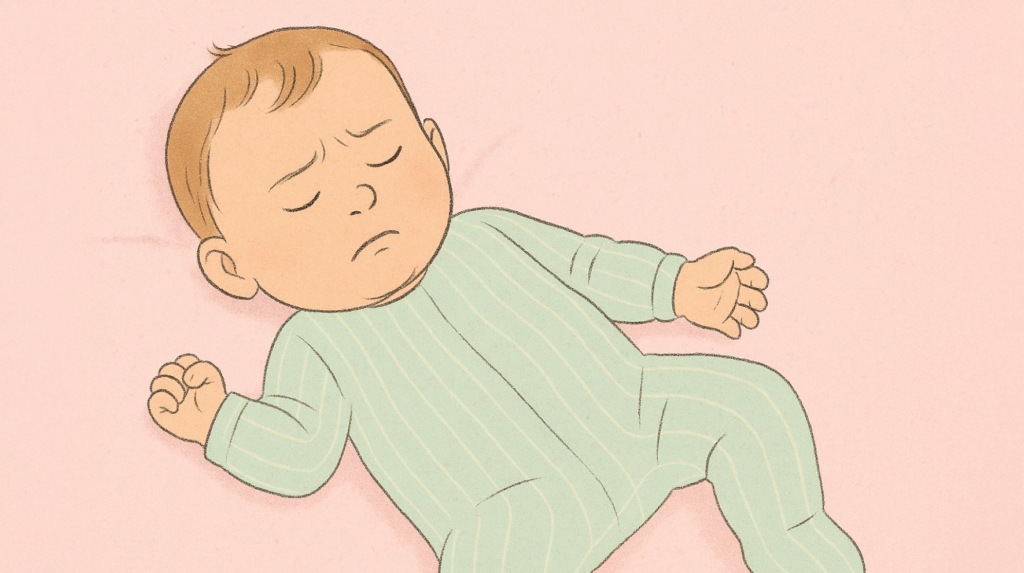We all keep hearing the phrase sleep like a baby, and we imagine our sweet pea sleeping soundly, cooing in between, and making the cutest little sighs.
But no one really prepares us for the grunts, burps, snorts, and all the strange sounds that come with baby sleep. And when you’re up at two a.m. wondering, “Is this normal? Should I be worried?”, it can feel a little overwhelming.
Here’s the reassuring truth: most baby sleep sounds, including grunting, are completely normal. They’re part of your baby’s development as they adjust to life outside the womb. But it’s also helpful to know when those sounds might be trying to tell you something more.
Let’s break it all down, the normal noises, the ones to keep an ear on, and tips to help your little one (and you!) sleep more soundly.
Why do babies grunt while sleeping?
The short answer is that their little bodies are still figuring things out, especially when it comes to digestion and breathing. Here’s what’s going on:
1. Immature digestive system
Your baby’s digestive tract is still developing, especially in the newborn stage (0–3 months). Grunting can be a sign they’re trying to pass gas or poop, even while they’re asleep. It’s often part of something called Grunting Baby Syndrome (GBS), yep, it’s a real thing!
In GBS, babies grunt, strain, or turn red in the face as they try to coordinate their abdominal muscles and pelvic floor to have a bowel movement. It sounds dramatic, but it’s completely normal and usually resolves on its own by around 3 to 4 months.
Grunting Baby Syndrome isn’t painful, it’s just your baby learning how to poop effectively while lying on their back!
2. Learning to breathe
Newborns are obligate nose breathers, which means they naturally breathe through their noses, even while sleeping. Since their nasal passages are super tiny, even a little bit of mucus or congestion can make their breathing sound like snorts, wheezes, or grunts.
As long as your baby seems otherwise content and is breathing regularly (even if it’s a little noisy), this is usually nothing to worry about.
3. Active sleep stage
Babies spend a lot of time in REM sleep (aka the active sleep stage), especially in the early months. Studies suggest during REM, babies may squirm, smile, make sucking motions, and yes, grunt.
This is all part of their normal sleep development and often means your baby is adjusting to the rhythms of sleep and wake cycles.
What’s normal (and what’s not) when it comes to baby grunting?
Here’s a quick cheat sheet to help you figure out whether your baby’s sleepy grunts are NBD or worth a call to your pediatrician.
| Grunting is normal when… | Grunting might need medical attention if… |
| It’s brief and happens during sleep | It’s constant and doesn’t stop when baby is awake |
| Baby isn’t in distress | Baby appears to be struggling to breathe |
| They’re growing, feeding, and pooping regularly | There’s a bluish tint around the lips or face |
| It’s paired with other sleep sounds (like snorts or squeaks) | Grunting is loud, persistent, and paired with flaring nostrils or chest retractions |
If you’re ever unsure, trust your gut and check in with your pediatrician. It’s always better to get peace of mind than to worry alone.
When to call your pediatrician
While most sleep grunting is harmless, it’s time to reach out to your doctor if:
- Your baby is gasping or choking during sleep
- Their grunting seems labored or is accompanied by wheezing or rapid breathing
- You notice blue coloring on their lips, tongue, or skin
- The grunting is persistent even when your baby is awake
- They’re having trouble feeding or gaining weight
These signs could indicate an underlying issue, like reflux, sleep apnea, or respiratory distress.
What can you do to help?
You don’t need to do anything if your baby’s grunting is part of their normal sleep soundtrack. But if you’d like to minimize the noise (so you can sleep better), here are a few gentle tips:
- Make tummy time part of your daily routine
This helps strengthen your baby’s core and can support digestion.
- Keep your baby upright after feedings
A little upright snuggle after eating can reduce gas buildup and ease reflux.
- Use a humidifier
If your baby sounds congested, a humidifier can help keep nasal passages clear.
- Check the crib environment
Make sure the baby’s mattress is firm and flat, and avoid extra pillows or soft bedding that could interfere with breathing.
- Try contact naps or motion naps during the day
Sometimes motion (like from a smart crib or contact nap with you) can help work out trapped gas and lead to deeper rest later.
Conclusion
Grunting is usually just part of being a baby, especially in the first few months. They’re adjusting to life outside the womb, learning how to poop, breathe, and sleep all at the same time.
So next time your baby lets out a little grunt mid-nap, you can take a deep breath and know: This is normal. You’re doing great. And if something feels off, your pediatrician is just a call away.
You might also like:
- Hydration 101 for babies: When, how, and why to offer water
- New federal safety rules for nursing pillows now in effect to protect babies
- Baby acne: why your newborn has pimples (and when it goes away)
Sources:
- https://pubmed.ncbi.nlm.nih.gov/40168519/
- https://www.healthychildren.org/English/tips-tools/symptom-checker/Pages/symptomviewer.aspx?symptom=Newborn+Reflexes+and+Behavior
- https://pmc.ncbi.nlm.nih.gov/articles/PMC9602694/#sec4-ijerph-19-13101
- https://www.cradlewise.com/blog/nrem-and-rem-stages-of-sleep-cycle/
- https://www.chop.edu/conditions-diseases/breathing-problems
- https://www.stanfordchildrens.org/en/topic/default?id=babies-need-tummy-time-1-2812
- https://www.healthychildren.org/English/tips-tools/ask-the-pediatrician/Pages/my-baby-has-a-stuffy-nose-how-can-i-help-them-sleep-safely.aspx
- https://publications.aap.org/pediatrics/article/doi/10.1542/peds.2016-1889/52741/Safe-Sleep-and-Skin-to-Skin-Care-in-the-Neonatal



